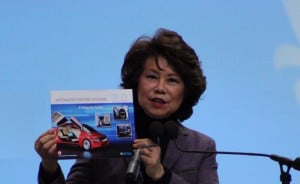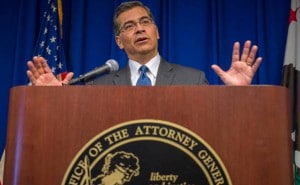
President Trump’s push to rollback CAFE standards may end up with a requirement for negligible improvements compared with the previous rule.
A long-simmering battle could come to a boil next week when the Trump Administration is expected to formally announce a rollback of the Corporate Average Fuel Economy, or CAFE, standards.
President Donald Trump has long advocated reducing the guidelines established during the Obama Administration that had called for an unadjusted fleet average 54.5 miles per gallon and which would have helped promote a shift to electrified vehicles. But the rollback has repeatedly been delayed, in part due to the unexpectedly tepid auto industry response to the virtual freeze in mileage the administration first outlined in 2018.
Precisely what the White House will now target – and when the new rules will be revealed – is uncertain, though an administration official told TheDetroitBureau.com that an announcement sometime in the coming week is likely. It is expected to now contain a modest 1.5% annual increase in fuel efficiency, rather than a summary freeze in vehicle mileage, but one that still falls well short of the current mandate.
(EPA, NHTSA submit final fuel economy proposals to Trump.)
What the administration has dubbed the “Safer Affordable Fuel-Efficient Vehicles Rule” attempts to justify a rollback in several ways, most notably by claiming that the push for better mileage would result in vehicles that are lighter and less likely to stand up to a crash. Administration officials, including Secretary of Transportation Elaine Chao, have also said that were vehicles to offer better mileage owners would drive more – and thus be more likely to have a fatal crash.

Transportation Secretary Elaine Chao unveiled the SAFE vehicles rule, rolling back Corporate Average Fuel Economy levels to current levels.
During a 2018 news conference, the White House claimed there would be an additional 12,700 highway fatalities by decade’s end were the original CAFE rules left standing. But that argument has been widely dismissed by those on both sides of the fuel economy debate.
The rollback has, in fact, divided the auto industry itself, especially with the president pressing to strip California of its right to set vehicle emissions rules even tougher than those set in Washington. Since carbon dioxide emissions are directly linked to how much fuel is burned, which translates into higher mileage.
While four automakers – Ford, BMW, Honda and Volkswagen – last year negotiated a deal with California to follow a slightly lower state target, others, including General Motors and Toyota, have sided with the administration, calling for the eliminating of the California waiver. But even some of the manufacturers that want a single, national mileage rule have sent signals they aren’t going to lavish support on a CAFE rollback.
Nor are environmental and consumer groups. In a telephone news conference on Friday, the proposed CAFE revisions came in for sharp attack from officials representing groups including the American Lung Association, the Union of Concerned Scientists and Consumer Reports.
(Trump confirms mileage standards cut, elimination of California clean air waiver.)
“In summary, it’s a senseless rollback,” declared Paul Billings, the Lung Association’s national chief for public policy. “It will have drastic consequences on health,” he said, estimating the higher level of pollution created by lower fuel economy will result in the deaths of up to 10,000 American by 2035.

California Attorney General Xavier Becerra said, “Mr. President, we’ll see you in court” at one point during the fight about CAFE.
One of the big debates about CAFE is how much it would cost to meet the Obama-era targets. The claim of higher vehicle prices to meet the stricter mandates is often cited by the White House, but proponents of higher mileage contend the argument is upside down.
The administration’s proposal would actually add $300 billion in higher fuel costs this decade, said David Friedman, Consumer Reports’ vice president of advocacy. That figure is also a matter of debate and would depend on fuel prices. Gas is quickly falling towards a national average of under $2 a gallon and is already well below that in some areas.
“But once we get past the coronavirus crisis” which has taken millions off the road, building up a petrol surplus, “fuel prices will recover,” said Friedman.
A number of environmental and consumer groups, as well as California and more than a dozen other states, have already filed lawsuits designed to protect the California waiver and block any CAFE rollback. Additional actions are expected once the final rules are announced.
(Trump admin eliminates CA waiver, delays details on fuel economy roll back.)
How soon those challenges would work through the courts is unclear, though with a backlog of legal cases building due to the coronavirus pandemic, it could push any final legal decision back months, and perhaps even beyond next January when the next president will be sworn in. Were a Democrat to take office, the odds are considered likely that the Trump rollback would be pulled off the table.

Well, now I know which side the author is on in this debate. How about fair reportage that also gives me a genuine sense of the argument on the other (rollback) side? Frankly, this piece reads like the “journalism” I get when I read my copies of the New York Times and Washington Post. I expected better.
We took every effort to be as fair and balanced as any media, whether Fox or NYT, Robert. The story does focus on the position laid out last week by the organizations participating in last week’s newser. Meanwhile, do note that the administration’s original proposal was harshly criticized, including by key automakers including Ford and Honda, and not just enviro and other consumer groups. That led the admin to delay action on the rollback for almost 18 months. The claims that the rollback would somehow save lives has so far been broadly derided, including by industry leaders — in fact, I was surprised how sharp the criticism was. There is no question that many in the industry would like to eliminate the California waiver, which I pointed out, in favor of a single national standard. But virtually every automaker I have spoken to has said the first proposal, and even the new target, 1) go too far, and 2) they likely will change very little of their previous planning, in part expecting the courts to either tie up or reject the final proposal. Industry planning is largely locked down through 2023-2024, at the soonest, so the most likely impact, IF the revisions were to stand and clear the courts quickly, will be a modest change in mix. That would translate into more sales of bit pickups and SUVs and likely more big engines, but little other changes. Sorry if this doesn’t reflect your political viewpoint. My goal is to capture the reality of what is happening. Support for the CAFE rollback is far less, even within the industry, than I had anticipated.
Paul A. Eisenstein